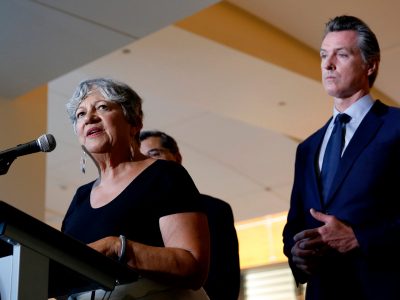

Three strikes and you’re out.
That adage, particularly timely given Major League Baseball’s belated start of its 2020 season this week, is just as apt when it comes to litigation as it is to our nation’s pastime.
For the second time in four months, U.S. District Court Judge William Shubb has rejected a constitutional challenge the Trump Administration has pursued against the State of California and, specifically, California’s Air Resources Board (CARB). In his July 16th ruling, Judge Shubb rejected a third and final constitutional argument advanced by the federal government, effectively ending the case–at the district court level, anyway.
I described the background and an earlier district court ruling in this nationally-watched case in a previous Legal Planet post. Briefly, in 2006 the California Legislature directed CARB to formulate a multifaceted strategy to reduce California greenhouse gas (GHG) emissions to 1990 levels by the end of 2020. (Subsequent state legislation extends that program into the future and imposes progressively more stringent GHG reductions.) CARB has made a statewide “cap and trade” program a centerpiece of its strategy to reduce California’s GHG emissions. In 2013, CARB entered into an agreement with the Canadian province of Quebec to link California’s cap-and-trade program to an analogous program adopted by Quebec. (That agreement is intended primarily to give GHG emitters in both California and Quebec more flexibility in meeting their GHG reduction obligations than would be the case if both governments pursued their regulatory programs separately.)
Last October, the Trump Administration sued the State of California and CARB in federal court in Sacramento, claiming that the California-Quebec “linkage agreement” is unconstitutional. In its complaint, the feds specifically alleged that the agreement contravenes three separate provisions of the U.S. Constitution: 1) the Treaty Clause, which requires that formal treaties between the United States and foreign nations require ratification by the U.S. Senate; 2) the Compact Clause which similarly requires Senate ratification of compacts between two or more states; and 3) the Foreign Affairs Doctrine, which provides that the conduct of international diplomacy with foreign nations is the province of the federal government–as opposed to individual states. (The Trump Administration’s complaint also advanced a fourth theory–that the California-Quebec agreement violates so-called Dormant Commerce Clause principles [i.e., impermissibly interferes with interstate commerce]–but the government wisely abandoned that claim while its lawsuit was pending.)
As described in my earlier post, District Judge Shubb unceremoniously rejected the Administration’s Treaty Clause and Compact Clause arguments in a ruling last March.
Undeterred, Trump Administration attorneys pursued their third and final legal theory: that the California-Quebec cap-and-trade agreement impermissibly intrudes on the federal government’s power to conduct foreign relations and therefore violates the Foreign Affairs Doctrine. Among other things, the Administration argued that California has no right to pursue “an independent foreign policy” regarding regulation of GHG emissions. It also alleged that the California-Quebec agreement somehow stands as an “obstacle” to the 1992 United Nations Convention on Climate Change; President Trump’s announced plans to withdraw the United States from the 2015 Paris Agreement on Climate Change; and the President’s ability to “engage in international deal-making on behalf of the United States.”
Last Thursday, Judge Shubb determined in a 30-page opinion that the federal government’s Foreign Affairs Doctrine arguments were just as meritless as its other, previously-rejected constitutional theories. He concluded, for example, that the 1992 UNCCC and the California-Quebec agreement both have the same general goals: reducing GHG emissions and thereby mitigating the deleterious impacts of climate change. Rejecting the Administration’s other Foreign Affairs Doctrine-based arguments, Judge Shubb concluded:
“[T]he United States offers no concrete evidence that California’s cap-and-trade program has interfered with either negotiations for a better deal [than the Paris Agreement] or the nation’s imminent withdrawal from the Paris accord.”
Strike three.
This litigation is now over, at least for the time being. It remains to be seen if the Trump Administration will appeal its legal defeat to the U.S. Court of Appeals for the Ninth Circuit. But given the specious constitutional arguments it’s advanced to date, the Administration would be wise to fold its litigation tents in this particular environmental law and policy dispute.
(Full disclosure notice: the author served as counsel of record for a coalition of Professors of Foreign Relations Law who filed amici curiae briefs in support of defendant State of California in U.S.A. v. California in both of the district court proceedings described in this post.)
The post Trump Administration’s Court Challenge to California-Quebec Cap-and-Trade Agreement Again Rejected appeared first on Legal Planet.
By: Richard Frank
Title: Trump Administration’s Court Challenge to California-Quebec Cap-and-Trade Agreement Again Rejected
Sourced From: legal-planet.org/2020/07/20/trump-administrations-court-challenge-to-california-quebec-cap-and-trade-agreement-again-rejected/
Published Date: Tue, 21 Jul 2020 06:13:55 +0000
Vist Maida on Social Me
Website Links
Maida Law Firm - Auto Accident Attorneys of Houston, by fuseology
No comments:
Post a Comment